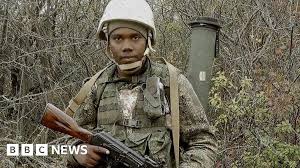A total of 1,000 Kenyans have been recruited to fight for Russia, according to a Kenyan intelligence report that details a network of rogue officials allegedly colluding with human trafficking syndicates.
The report, submitted to parliament on Wednesday by Kenya's National Intelligence Service (NIS), said 89 Kenyans were on the front lines of the Russia–Ukraine war as of February this year.
At least one Kenyan has died, while several others have returned home injured or traumatised, it added.
The Kenyan government, which previously estimated that about 200 of its nationals had been recruited to fight for Russia, wants Moscow to bar the conscription of Kenyan soldiers.fers and sent to fight for Russia - Kenyans want their sons back.
Presenting the report to MPs, parliament majority leader Kimani Ichung'wah, revealed what he termed a "deeply disturbing" network of rogue state officials allegedly colluding with human trafficking syndicates to recruit and transport Kenyans to fight in the Russia–Ukraine war.
The spy agency detailed how recruitment agencies have allegedly been colluding with rogue Kenyan airport staff, immigration officers, officers at the Directorate of Criminal Investigations (DCI), anti-narcotics officers and National Employment Authority officers to facilitate recruits' travel.
Ichung'wah alleged that the agencies had also been colluding with staff at the Russian embassy in Nairobi and the Kenyan embassy in Moscow to help recruits get Russian visas.
In a statement on Thursday, the Russian embassy in Nairobi dismissed the allegations as "dangerous and misleading", saying that its staff has never been involved in "rogue schemes" or engaged in illegal enlistment.
"At no point in time throughout the ongoing crisis in Ukraine [has] the Embassy ever issued visas to Kenyan citizens who sought to travel to Russia with the stated pose of participating in the Special Military Operation (SMO) in Ukraine.
"Nor the Embassy been encouraging any Kenyan citizen to do so."
The embassy added that while it does not recruit foreigners, Russian law allows foreign nationals who are legally in Russia to voluntarily enlist in their armed forces.
While in parliament, Ichung'wah said that Kenya's ambassador to Moscow "must be able to identify the officers within the embassy that may have colluded with these criminals. Our embassy must be beyond reproach. It must be the place where Kenyans can seek refuge, not exploitation."
"Government offices are not to be used for criminal activities," he added.
The BBC has asked the Kenyan foreign ministry for comment.
The report did not say what had happened to the majority of the recruits but said that in addition to those on the front line, another 35 had been sent to military camps in Russia, 39 are injured and 28 are missing.
According to the investigation, ex-military personnel, ex-police officers and unemployed Kenyans aged 20–50 are the main targets of the recruiters.
Recruits are promised a monthly pay of up to 350,000 Kenyan shillings ($2,400; £2,000), with bonuses ranging from KSh 900,000 to KSh 1.2 million ($6,200–$8,300;£5,200–£7,000).
However, upon arrival, many reportedly find themselves deployed to front-line combat roles after minimal military training.
"They are told you are going to work as a guard… only to get there and you are taken to military camps," Ichung'wah said.
"You've only trained for three weeks. They are basically just giving you a gun to go and die," he added.
Those undergoing explosives and weapons training are only required to attend training for nine days before being sent to the front line, the report said.
Ichung'wah said that, initially, recruits departed through Nairobi's Jomo Kenyatta International Airport (JKIA) using tourist visas and travelled through Turkey and the United Arab Emirates (UAE).
However, with heightened surveillance at JKIA, traffickers reportedly changed tactics, rerouting victims through South Africa, Uganda and other neighbouring states.
The report identified some of the rogue agencies behind the recruitment of Kenyans and the medical facilities used for testing.
Authorities say several suspects, including the alleged mastermind, remain under active investigation, with further arrests expected. Investigations continue as officials seek additional suspects and work to rescue Kenyans still caught in the conflict.
Speaking to the BBC last week, Kenya's Foreign Minister Musalia Mudavadi said Nairobi had shut down more than 600 recruitment agencies suspected of duping Kenyans with promises of jobs overseas.
Mudavadi said Kenya was working closely with Russia on curbing illegal recruitment practices, including discussions on visa policy and bilateral labour agreements excluding military conscription.
The foreigner minister is due to visit Moscow next month to discuss the matter.
So far 27 Kenyans who had been fighting in Russia have been repatriated, he said, with authorities providing psychological care to address their trauma and "de-radicalise" them.
Pressure has been mounting on the Kenyan government to act after the recent discovery of more bodies of nationals of African countries who had been recruited to fight for Russian armed forces.
Last November, Ukraine's foreign minister said that more than 1,400 people from 36 countries in Africa had been recruited to fight for Russia.
Ukraine has also previously come in for criticism for trying to recruit foreign nationals, including Africans, to fight on its side.
Ukrainian officials have repeatedly warned that anyone fighting for Russia will be treated as an enemy combatant, and that the only safe route out is to surrender and be treated as a prisoner of war.






